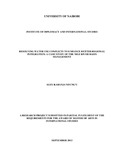| dc.description.abstract | This study identifies the historical and present issues revolving around the sharing of the
Nile Basin resources amongst the Nile riparian countries (namely; Egypt, Sudan,
Ethiopia, Eritrea, Uganda, Kenya, Tanzania, DRC, Rwanda and Burundi). In their search
for both a consensus vision and equitable utilisation of the Nile Basin water resources
certain disputes and area of potential conflict have emerged.
In the study the disagreements and disputes in the sharing of the Nile basin water
resources, is indisputably rooted in the historical background of the Nile river basin
where Egypt has been the predominant user of the basin-wide water resources of the
River Nile. Egypt in particular has always laid claim to what it calls its ‘historical rights’
to the Nile basin waters. It further argues that the said rights are embodied in the various
Treaties concluded by United Kingdom and other states ostensibly governing the use of
Nile waters. Historically, the river provided the Egyptians with almost all their fresh
water and has long been regarded as the cultural symbol of Egypt dating back to the times
of the pharaohs.
It is argued in this study, that resolving water use conflicts will enhance better regional
integration among the riparian countries and in particular members of the Common
Market for Eastern and Southern Africa [COMESA] preferential trading bloc.
Necessarily therefore a re-evaluation of the existing initiatives should be aimed at
achieving win-win opportunities to all riparian countries and holding out the promise of
regional integration, peace and prosperity. Continuous progress will require not only a
willingness from Nile riparian countries to continue revising their past visions of
cooperation but also to creatively assemble appropriate legal infrastructure to achieve a
lasting solution to the Nile basin resources sharing and management. | en |

